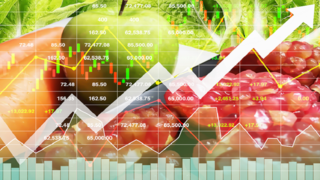A new study revealed that climate change and rising temperatures are causing food prices to rise by 3.2% annually.
As climate change continues to worsen, price inflation will reduce the diversity of healthy food for people around the world, or simply become insufficient in nutrients.
The German study shows that global warming could lead to an increase in food price inflation by between 0.9 and 3.2% annually by 2035.
Africa will be the most affected, despite its small contribution to the causes of climate change.
The Intergovernmental Panel on Climate Change describes West Africa as a climate change “hotspot,” with models predicting extreme temperatures and falling precipitation. With more than half the population relying directly on rain-fed agriculture, Ghana is particularly vulnerable to climate change.
Climate-related food inflation can be divided into two interrelated problems: changing seasons, and pests and diseases.
For example, rising temperatures can change long-standing, predictable agricultural seasons, potentially hindering crop production.
Other consequences could include further outbreaks of pests and diseases that deplete livestock and food reserves, and heat stress on already poor roads, making it difficult to reach rural communities.
All of these factors push prices up and reduce the purchasing power of affected families, exacerbating food insecurity.
A 3% annual price increase means that families are less able to buy what they need. You will likely need to compromise on quality or even value foods, which in turn makes people more vulnerable to disease and other health problems.
The researchers of the new study point out that reducing greenhouse gas emissions could limit any impacts on the global economy. They also suggest diversifying economies to protect those communities that depend on agriculture for their food and income.
Tags:
german study
global catastrophe
higher food prices
hotspot
lead food prices
science
study warns






It is highly worrying.
ReplyDeleteGood
ReplyDeleteGood
ReplyDeleteExcellent
ReplyDeleteExcellent 👌🏻
ReplyDeleteOsm
ReplyDeleteGood
ReplyDeleteGood
ReplyDeleteGood
ReplyDeleteGood
ReplyDeleteGood
ReplyDeleteGood 😊
ReplyDeleteA new study revealed that climate change and rising temperatures are causing food prices to rise by 3.2% annually.
ReplyDeleteAs climate change continues to worsen, price inflation will reduce the diversity of healthy food for people around the world, or simply become insufficient in nutrients.
The German study shows that global warming could lead to an increase in food price inflation by between 0.9 and 3.2% annually by 2035.
Africa will be the most affected, despite its small contribution to the causes of climate change.
G
ReplyDeleteAmazing
ReplyDeleteClimate-related food inflation can be
ReplyDeleteGreat
ReplyDeleteSuper
ReplyDeleteExcellent
ReplyDeleteWhat is
ReplyDeleteGreat
ReplyDeleteGood
ReplyDelete